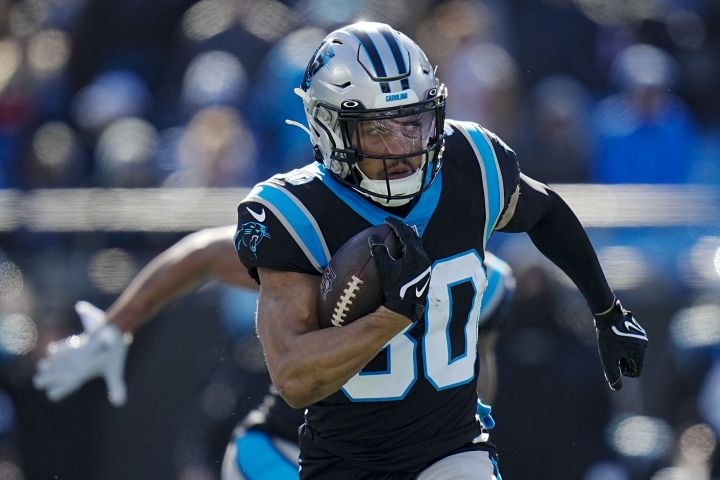The attorneys who beat the NCAA in the Supreme Court of the United States have filed a new class-action antitrust lawsuit against the association and the five wealthiest college sports conferences that seeks millions of dollars in damages for thousands of athletes.

The case was filed Tuesday — the day after the NCAA Tournament concluded — in the Northern District of California, where several other landmark cases involving college sports have been heard.
The plaintiffs are listed as former Oklahoma State running back Chuba Hubbard, who is currently with the Carolina Panthers, and former Auburn track athlete Keira McCarrell, but the lawsuit seeks triple damages for all current and former Division I athletes as far back as 2018.
Hubbard grew up in Sherwood Park, Alta., before moving to the U.S. to play college football.
READ MORE: Alberta’s Chuba Hubbard says rookie NFL year ‘a dream come true’
The defendants named in the lawsuit are the NCAA, the Atlantic Coast Conference, Big Ten, Big 12, Pac-12 and Southeastern Conference.

Get daily National news
A 2019 ruling by a federal judge in the so-called Alston case against the NCAA made it permissible for schools to provide nearly $6,000 in academic benefits to college athletes.
The NCAA appealed the ruling all the way to the Supreme Court. In 2021, the court ruled unanimously against the NCAA.
“Since the Supreme Court’s decision in Alston, dozens of Division I schools have announced that they will be providing $5,980 academic awards to athletes across all sports,” attorney Steve Berman said in a statement.
“Thousands of female and male athletes, including many in sports other than football and basketball, will directly benefit from this action aimed at recovering the monetary awards, of which the NCAA illegally deprived them.”
The NCAA did not immediately respond to request for comment.
Berman, of the Seattle-based firm Hagens Berman, and Jeffrey Kessler, a New York-based attorney with Winston & Strawn LLP, were the lead lawyers on the Alston case.
“While the injunction striking down the NCAA’s restrictions on education-related compensation, which was unanimously affirmed by the Supreme Court in Alston, unlocked life-changing benefits for NCAA Division I athletes moving forward, it did not rectify the harm suffered by thousands of Division I athletes who were unlawfully prevented from receiving education-related compensation before the injunction was issued,” Kessler said in a statement.
“Plaintiffs aim to recover triple damages for those injuries here.”
Berman and Kessler have another open case against the NCAA that is seeking to recoup damages dating back to 2016 for college athletes who were denied by NCAA rules to earn money from their names, images and likenesses.
READ MORE: Kingston Ice Wolves’ Gilmour signs NCAA D-1 scholarship with Providence College
House vs. the NCAA also asserts college athletes should be permitted to share in the billions of dollars the association and some conferences make in media rights deals.
The NCAA has lost the two previous lawsuits filed in the Northern District of California that have gone to trial before U.S. District Judge Claudia Wilken, including a 2014 ruling in an antitrust case that challenged the NCAA’s ability to use the name, image and likeness of college athletes for commercial purposes.
READ MORE: Pennsylvania governor says he’s disappointed judge threw out lawsuit vs. NCAA
The NCAA lifted its ban on college athletes being compensated for sponsorship and endorsement deals in 2021, shortly after the Supreme Court ruling in the Alston case.
College sports leaders have been asking for help from federal lawmakers to regulate NIL compensation ever since, but to no avail.
The NCAA is also currently facing a separate — potentially greater — legal threat in Pennsylvania, where a federal lawsuit seeks to have college athletes deemed employees of their schools.
–With a file from Global News










Comments
Want to discuss? Please read our Commenting Policy first.